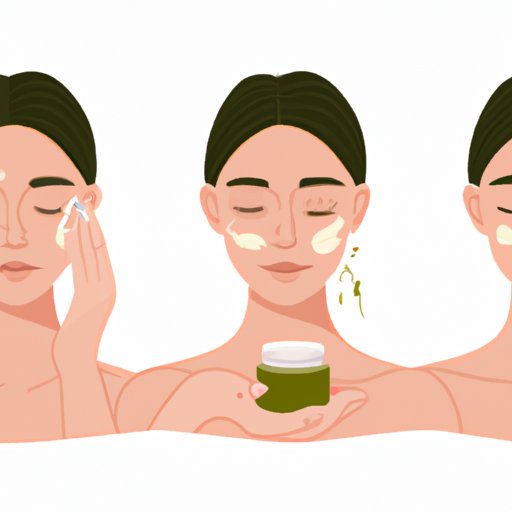
Introduction
Having smooth skin is not only aesthetically pleasing, but it also plays a significant role in boosting one’s confidence level. Unfortunately, many people struggle with skin texture issues. In this article, we’ll discuss some common struggles and provide practical solutions to achieve smooth skin.
Proper Cleansing Techniques
Proper cleansing is the foundation of any good skincare routine. It helps to remove dirt, oil, makeup, and other impurities that accumulate on the skin’s surface. To cleanse your face effectively, you need to choose the right cleanser based on your skin type.
If you have dry skin, look for a cream or lotion-based cleanser that won’t strip your skin of its natural oils. However, if you have oily skin, choose a foaming cleanser that will help to remove excess oil without drying your skin.
To cleanse properly, start by washing your hands to avoid spreading bacteria to your face. Then, wet your face with lukewarm water and apply a small amount of cleanser, massaging it in circular motions. Rinse thoroughly with lukewarm water and pat your face dry with a soft towel.
Exfoliating Regularly
Exfoliating your skin is another crucial step to achieve smooth and radiant skin. It involves removing dead skin cells and unclogging pores, allowing new and healthy skin to regenerate.
There are two types of exfoliants: physical and chemical. Physical exfoliants contain granules or particles that physically remove dead skin cells, while chemical exfoliants use enzymes or acids to dissolve them.
To avoid damaging your skin’s protective barrier, it’s recommended to exfoliate no more than twice a week. If you have sensitive skin, opt for a mild exfoliant and patch test it first.
Staying Hydrated
Drinking enough water is essential for overall health, and it also plays a vital role in skin health. When the body is hydrated, it helps to keep the skin plump, firm, and healthy-looking.
The recommended daily intake of water is eight glasses or 2 liters. If plain water is not your thing, try adding fruits or herbs to infuse flavor. You can also stay hydrated by using a humidifier at home, especially during the dry winter months.
Moisturizing Regularly
Keeping your skin moisturized is vital for achieving a smooth and healthy-looking complexion. It helps to improve skin texture, reduce dryness, and prevent premature aging.
To choose the right moisturizer, look for ingredients that match your skin type. For example, if you have dry skin, look for hydrating ingredients like hyaluronic acid or glycerin. If you have oily skin, look for lightweight, oil-free moisturizers that won’t clog pores.
Apply moisturizer twice a day, after cleansing and toning, to help seal in water and hydrate the skin. If you’re using a retinoid or acne treatment, apply it after moisturizing.
Protecting Your Skin from the Sun
Sun exposure is one of the primary causes of skin damage, including wrinkles, fine lines, and hyperpigmentation. To prevent such damage, it’s essential to wear sunscreen every day, even during cloudy or winter days.
Look for sunscreen with at least SPF 30 and broad-spectrum protection, meaning it protects against both UVA and UVB rays. Apply it generously 15 minutes before sun exposure, and reapply every two hours or after swimming or sweating.
Other ways to protect your skin from environmental damage include wearing protective clothing, hats, and sunglasses, and avoiding peak sun exposure between 10 a.m and 4 p.m.
Eating a Healthy Diet
What you eat plays a significant role in skin health. A well-balanced diet rich in fruits, vegetables, healthy fats, and lean proteins can help to promote smooth skin and prevent acne and other skin issues.
Some of the best foods for promoting healthy skin include avocados, sweet potatoes, salmon, nuts, leafy greens, and citrus fruits. Also, consider supplementing your diet with vitamins and minerals, such as vitamin C, E, and zinc, which promote skin health.
Conclusion
Achieving smooth skin requires a combination of proper cleansing, regular exfoliation, staying hydrated, moisturizing, protecting your skin from the sun, and eating a healthy diet. Incorporate these tips into your daily routine and see how they work together to promote healthy, radiant, and smooth skin.
Always remember that everyone’s skin is unique, so you may need to experiment with different products and techniques to find what works best for you. Consult with a dermatologist if you have any persistent skin concerns.




